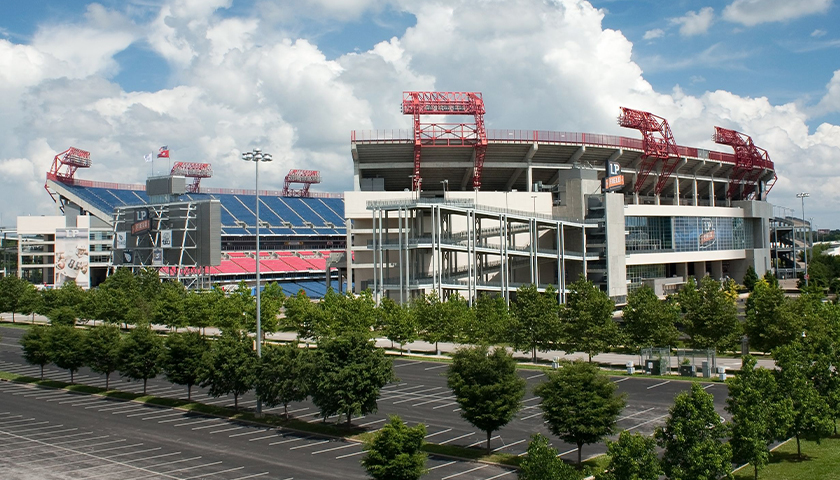by John Styf
Members of the Metro Nashville City Council will be asked to approve a term sheet and legislation to enact a 1% hotel-motel tax starting Feb. 1 with its initial consideration of both to begin at the board’s Nov. 1 meeting.
The term sheet outlines plans for the projected $2.1 billion new stadium for the Titans, including the order of financing and how a fund that includes the hotel tax and sales tax at the stadium and outside the stadium can be used. The stadium is expected to be ready for the 2026 NFL preseason. The lease will be for the term of the bonds — about 30 years — with three five-year renewal options.
[wonderplugin_pdf src=”https://tennesseestar.com/wp-content/uploads/2022/10/pdf-00-term-sheet.pdf” width=”650px” height=”800px” style=”border:0;”]
The term sheet was presented to the Metro Nashville Sports Authority by Deputy Mayor Sam Wilcox on Thursday.
The terms include the state of Tennessee contributing $500 million, Nashville contributing $760 million from its Sports Authority from the sales and hotel tax fund and the Titans, represented by an entity that will be called StadiumCo, will need to prove it can provide $840 million from the sale of personal seat licenses, an NFL loan and private financing.
The deal states, however, that the team would not be required to provide full operational financial information or audit rights. A letter from Titans owner Amy Adams Strunk, explaining that she cannot provide a guarantee she will not sell the team due to NFL rules, was included with the term sheet.
“I recently learned that your team has expressed a concern about a potential sale of the Titans and proposed a contract provision to address that concern,” Strunk wrote in the letter to Nashville Mayor John Cooper.
“We fully expect to keep the Titans in Nashville,” Strunk wrote. “Thankfully, NFL rules do allow us to make that commitment as part of the deal, and we were happy to include it in the term sheet. Perhaps more important, I should add that throughout this process we have never considered the possibility of relocating the team.”
[wonderplugin_pdf src=”https://tennesseestar.com/wp-content/uploads/2022/10/pdf-01-titans-letter.pdf” width=”650px” height=”800px” style=”border:0;”]
The $2.1 billion stadium cost will include the cost of demolishing the current Nissan Stadium. The Titans are responsible for paying off $30 million of bonds on the current stadium. The team has hired Manica Architecture, which build Las Vegas’ Allegiant Stadium, to complete the project.
The sales and hotel tax fund will first pay for the sports authority bonds. The team will not backstop the bonds and the city will be responsible from its general fund for backstopping them if required. The team will pay $3 per ticket sold for non-football events into the fund as well as continuing to pay a $3 ticket tax for Titans games into the fund as rent.
The Sports Authority will sign a separate agreement with Tennessee State to use the stadium.
If the stadium project cost exceeds $2.1 billion, the team will have to prove why that additional cost is necessary and prove it has the additional funds to pay for it.
The new terms include a “first-class” condition requirement with comparison stadiums being Allegiant Stadium, Atlanta’s Mercedes-Benz Stadium and U.S. Bank Stadium in Minneapolis. A similar requirement has been used to say that Metro Nashville would have to pay between $1.75 billion and $1.95 billion to fulfill its obligations in the case the Titans were to take a team option to extend their current lease at Nissan Stadium. To this point, the Titans have not exercised that option.
If there is excess sales and hotel tax following the revenue bond payment, it can be used to fund capital projects and maintenance at the stadium. If those funds are not sufficient for a project, the Titans would be responsible for the cost.
If the Capital Repairs Fund cap is met, excess funds can be paid up to $25 million to Nashville’s general fund and then excess would be sent to a reserve fund. If the reserve fund meets 120% of its goal, and the revenue bonds are paid off, Metro Nashville would then have the option of ending the hotel tax.
[wonderplugin_pdf src=”https://tennesseestar.com/wp-content/uploads/2022/10/pdf-02-mayor-cooper.pdf” width=”650px” height=”800px” style=”border:0;”]
[wonderplugin_pdf src=”https://tennesseestar.com/wp-content/uploads/2022/10/pdf-03-venue-solutions-group.pdf” width=”650px” height=”800px” style=”border:0;”]
– – –
Jon Styf is an award-winning editor and reporter at The Center Square who has worked in Illinois, Texas, Wisconsin, Florida and Michigan in local newsrooms over the past 20 years, working for Shaw Media, Hearst and several other companies.






So, a “Titans Stadium Fund” gets to suck up a specially appointed chunk of motel tax? What about other Nashville venues and entertainment draws ? They’re just SOL I guess…
“A letter from Titans owner Amy Adams Strunk, explaining that she cannot provide a guarantee she will not sell the team due to NFL rules, . . . ”
O. K. then, IF THAT IS THE WAY THAT IT IS, Ms. Strunk, the State of Tennessee WILL NOT provide $500M in financing for this deal! THOSE ARE STATE OF TENNESSEE RULES! PLUS, EVERYTHING will be public information for all to immediately know! THAT IS THE WAY THAT IT WILL HAVE TO BE IF THE STATE OF TENNESSEE IS TO PROVIDE SO MUCH AS A DIME FOR THIS BOONDOGGLE (and actually I hope that the State of Tennessee does not do this deal)! Seems fair to me!
Taxpayers are paying for this. The Mayor is a liar and he knows it. Taxes taken from the public regardless of the source of those taxes are to be used to pay for a needless entertainment venue that does not benefit the public. This is simply not an acceptable use of taxpayer funds.